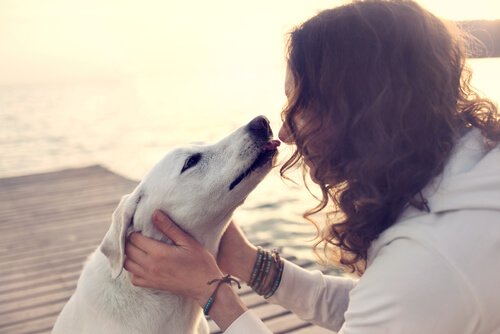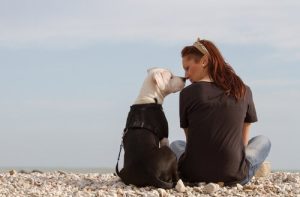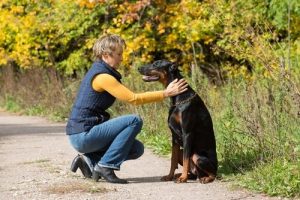Nasty Infections You Could Get From Kissing Your Dog On The Mouth

We tend to think that kissing our dog, or allowing him to give us a smooch, is nothing more than a great way to demonstrate affection. Of course, our beloved dog is not just a pet – they are part of our family, one more creature living happily under our roof. While some studies indicate that it’s good and healthy to kiss your dog, the truth is that doing so can spread diseases and infections.
Kissing dogs = cross-transmission of infections

It’s a beautiful thing to feel love for a dog, and to express that love. But this can have negative consequences not only for the dog, but also for the human involved. Having too much close contact with dogs promotes the transmission of bacteria and viruses. This can increase the possibility of contracting dental diseases.
According to a study carried out by a group of Japanese scientists from the University of Osaka and led by Dr. Yoji Yamkazi, many people consider their dog to be another member of the family. For this reason they see nothing wrong with kissing them on the mouth or face. The study found that individuals that did this were more likely to get sick, since their pets transmitted viruses usually contracted by dogs.
The research analyzed the health of 66 dogs and their owners, as well as that of veterinarians and volunteers at animal shelters. The results were striking – in the majority of cases, people who usually kissed their dogs had bacteria in their mouth that causes periodontitis.
This is a very serious infection that damages the bones and ligaments that support the teeth, making the teeth likely to become loose or fall out completely. At the same time, the dogs had oral bacteria characteristic of human beings.
Although the bacteria of humans and dogs is different, it can still be transmitted from one to the other through kissing or other close physical contact.
What happens when you kiss your dog?
If you are one of those people who sleeps with your pet or kisses them on the face or mouth, it’s important to bear in mind that they may have ticks, which can cause Lyme disease in humans.
But how can kissing our dogs mean we end up contracting this serious ailment? Well, dogs tend to lick themselves where the ticks cause them pain or irritation. If they have ticks they will try to remove them by biting the area. These parasites spend a lot of time clinging to the skin of the animal and suck their blood. Dogs can also become infected by the disease which they can pass onto humans through saliva.
Another infection we risk contracting through kissing dogs is rabies. Yes, rabies affects not only animals, but also humans. And it is transmitted through saliva! In dogs it causes very high fever, aggressive behavior, and even death if it spreads to the brain.
A serious consequence of kissing dogs – parvovirus

This disease is highly contagious, and the two routes of transmission are saliva and feces. Parvovirus is so resistant that it can survive for a long time in extreme climatic conditions (cold, heat, dryness, humidity, etc.). It mainly affects puppies of up to four months old, if they have not been vaccinated.
This virus is very contagious, and can be spread to humans through kissing dogs. The breeds that are most vulnerable to parvovirus – which can be fatal – are Rottweilers and Dobermans. If we do not immunize our pet against this disease, it is more likely to contract it, and spread it through kissing.
For this reason, we always recommend dog owners vaccinate their pets to prevent all kinds of complications. Not only in the dogs themselves but also in the whole family.
We advise you not to kiss your dog, even if the animal seems very healthy and hygienic. The truth is that we never know what our pet may have come into contact with over and we have no idea what viruses or bacteria are living in their mouths.